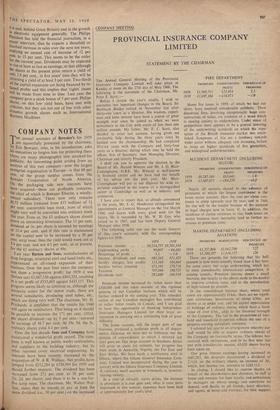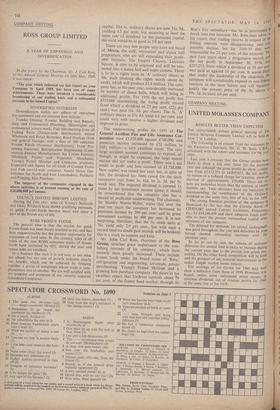COMPANY NOTES
THEannual accounts of Bowater's for 1959 are masterfully presented by the chairman, Sn* Eric Bowater, who, in his introduction, asks., his executives to forgive him for projecting them (there are many photographs) into unasked-for Publicity. An interesting point arising from an analysis of this vast company—now the largest newsprint organisation in Europe—is that 60 per cent. of the group surplus comes from the Bowater Corporation of North America. On the packaging side new interests have been acquired—these are profitable concerns, the chief of which is Bowater Eburite, a wholly- owned subsidiary. There now only remains 46.52 million (reduced from £15 million) of 53 Per cent. convertible loan stock, most of which alight very well be converted into ordinary stock this Year. Even so, the £1 ordinary shares should Prove an interesting investment. The 15 per cent. dividend at 3s. per share is covered by earnings of 33.4 per cent. and if this rate is maintained on the capital now to be increased by a 20 per cent, scrip issue, then the yield would work out at 5.4 per cent. and not 4.3 per cent., as at present,
for the ordinary shares at 69s.
Last year Barton and Sons, manufacturers of drop forgings, structural steel and hand tools, etc., experienced an all-round expansion of their business. Over the past four years the company can show a progressive profit; for 1959 it was (before tax) £1,047,530 against £865,333, resulting In a net profit of £533,603 against £433,117. This Progress seems likely to continue as, although the
comp -
any caters for the motor trade, there are
several subsidaries, producing steel tubes, etc., which are doing very well. The chairman, Mr. H. Prichards, is confident that the results for 1960 will again be satisfactory. That being so, it should be possible to increase the 17} per cent. (104d. per share) dividend—up by 5 per cent.—covered by earnings of 48.7 per cent. At I9s. 9d. the Ss. ordinary shares yield 4.4 per cent.
Over the last decade Inns and Company have maintained a wonderful profit record. The com- pany is well known as public works contractors, and suppliers to the building industry, but its other interests cover electrical engineering. Its interests have been recently increased by the acquisition of W. & R. Wallace. Net profits have Jumped from £212,284 to £338,999 for 1959 and should further improve. The dividend has been Increased from 273 per cent. to 30 per cent. (Is. 2d. per share), and there is to be a one-for- five scrip issue. The chairman, Mr. Walter Wal- lace, states that he intends to pay at least the same dividend (i.e., 30 per cent.) on the increased
capital. The 4s. ordinary shares are now 31s. 9d., yielding 4.5 per cent., but assuming at least the same rate of dividend on the increased capital, the yield would be as good as 5.6 per cent.
There are very few people who have not heard of Mecca, the café, restaurant and dance hall proprietors, who are still expanding their Troth- able business. The Empire Cinema, Leicester Square, is now to be acquired and will be con- verted into a dance hall and super-cinema. There is to be a rights issue in 'A' ordinary shares at 10s. each (making the rights worth about 6s. each), which will produce £1.4 million. The com- pany has, in the past year, considerably increased its number of dance halls, which will bring in additional profits. For 1959 the net profit was £319,006 maintaining the rising profit record from which a dividend of 25 per cent. (221 per cent.) was paid (Is. 3d. per share). The 5s. 'A' ordinary shares at 27s. 6d. yield 4.6 per cent. and could very well receive a higher dividend and improve in price.
The underwriting profits for 1959 of The General Accident Fire and Life Assurance Cor- poration were £1,928,000 against £746,000, and premium income increased by f51 million to £681 million-a very excellent result. The very large accident account continues to expand, al- though, as might be expected, the large motor section did not make a profit. There was a net credit to profit and loss account of £1,788,000. New capital was raised last year, but, in spite of this, the dividend has been raised for the sixth successive year from Is. 41d. to 2s. 3d. per 5s. stock unit. The required dividend is, covered 11 times by net investment income alone; it should be remembered that the company also has a record of profitable underwriting. The chairman, Sir Stanley Norrie-Miller, states that over the past' ten years the company haS increased its premium income by 200 per cent. and its gross investment earnings by 400 per cent. It is not surprising, therefore, that the 5s. stock units at 76s. yield only 2.9 per. cent., but with such a record (and no doubt past records will be broken) this is a stock to acquire and keep.
Mr. John Carl Ross, chairman of the Ross Group, attaches great importance to the non- fishing interests of his company, which have recently been greatly increased. These include frozen foods under the brand name of 'Ross,' refrigeration and engineering, ice-cream, potato merchanting, Young's Potted. Shrimps' and a growing hire-purchase company. He states in his excellent report that Unilever controls about 70 per cent. of the frozen food market, through its Bird's Eye subsidiary-but he is determined 10 break into this business. Mr. Ross does admit, In his report, that trading returns in respect of ill° fishing' interests were disappointing. and maY, possibly decline, but for 1958-59 they we!' responsible for 24 per cent. of the turnover. Tne, past four years show a progressive record, a" the net profit to September 30, 1959, was £237,215, from which a dividend of 18 per cent' was paid as against 14 per cent. It seems likely that under the leadership of the chairman, the company will considerably expand its non-fishing interests in the near future and will therefore justify the present price of the 5s. shares at 19s. 3d. to yield 4.6 per cent.







































 Previous page
Previous page